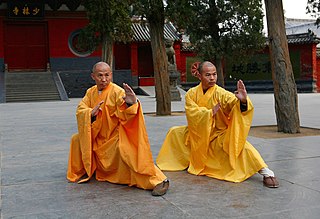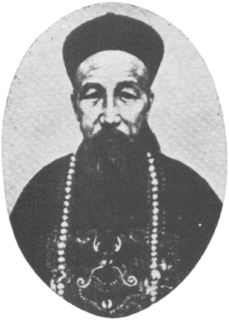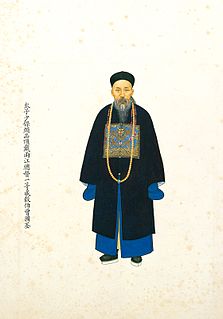
The Shunzhi Emperor was Emperor of the Qing dynasty from 1644 to 1661, and the first Qing emperor to rule over China proper. A committee of Manchu princes chose him to succeed his father, Hong Taiji (1592–1643), in September 1643, when he was five years old. The princes also appointed two co-regents: Dorgon (1612–1650), the 14th son of the Qing dynasty's founder Nurhaci (1559–1626), and Jirgalang (1599–1655), one of Nurhaci's nephews, both of whom were members of the Qing imperial clan.

Li Qingzhao, pseudonym Householder of Yi'an (易安居士), was a Chinese poet and essayist during the Song dynasty. She is considered one of the greatest poets in Chinese history.
Li Chengliang was a Ming dynasty general of Korean descent.

The Shun dynasty, officially the Great Shun, was a short-lived dynasty that existed during the Ming–Qing transition in Chinese history. The dynasty was founded in Xi'an on 8 February 1644, the first day of the lunar year, by Li Zicheng, the leader of a large peasant rebellion, by proclaiming himself Emperor (皇帝) instead of the title King (王) before founding the dynasty.
The spelling of Gwoyeu Romatzyh (GR) can be divided into its treatment of initials, finals and tones. GR uses contrasting unvoiced/voiced pairs of consonants to represent aspirated and unaspirated initials in Chinese: for example b and p represent IPA [p] and [pʰ]. The letters j, ch and sh represent two different series of initials: the alveolo-palatal and the retroflex sounds. Although these spellings create no ambiguity in practice, readers more familiar with Pinyin should pay particular attention to them: GR ju, for example, corresponds to Pinyin zhu, not ju.

Wu Yuxiang or Wu Yu-hsiang (1812–1880) was a t'ai chi ch'uan (taijiquan) teacher and government official active during the late Qing dynasty. Wu was a scholar from a wealthy and influential family who became a senior student of Yang Luchan. Wu also studied for a brief time with a teacher from the Chen family, Chen Qingping, to whom he was introduced by Yang.

The Xiang Army or Hunan Army was a standing army organized by Zeng Guofan from existing regional and village militia forces called tuanlian to contain the Taiping Rebellion in Qing China. The name is taken from the Hunan region where the Army was raised. The Army was financed through local nobles and gentry, as opposed to through the centralized Manchu-led Qing dynasty. The army was mostly disbanded by Zeng after the re-capture of the Taiping capital at Nanking.

Zeng Guoquan, courtesy name Yuanfu, art name Shuchun, was a Chinese official and military leader of the late Qing dynasty. He was the ninth brother of Zeng Guofan, a prominent statesman and general, and a descendant of the philosopher Zengzi. He served in the Xiang Army, a standing military force organised by his brother to counter the Taiping rebels, and was nicknamed "Ninth Marshal" (九帥). He was known for his expertise in siege warfare, particularly the use of trenches, hence he was also nicknamed "Zeng the Iron Container" (曾鐵桶). During the conquest of Tianjing (Nanjing), the capital of the Taiping Heavenly Kingdom, Zeng was notorious for condoning massacres of the city populace, which resulted in him being called "Zeng the Butcher" (曾屠戶).
The Huai Army, named for the Huai River, was a military force allied with the Qing dynasty raised to contain the Taiping Rebellion in 1862. It was also called the Anhui Army because it was based in Anhui province. It helped to restore the stability of the Qing dynasty. Unlike the traditional Green Standard Army or Eight Banners forces of the Qing, the Huai Army was largely a militia army, based on personal rather than institutional loyalties. It was armed with a mixture of traditional and modern weapons. Li Hongzhang, a commander in the Xiang Army, created the Huai Army in October 1861. It succeeded Zeng Guofan’s Xiang Army. The Huai Army itself was succeeded by the New Army and the Beiyang Army, which were created in the late 19th century.
Rudolf Komorous is a Czech-born Canadian composer. His works include Twenty-Three Poems about Horses (1978), based on the poetry of Li Ho, the opera No no miya (1988) which uses elements of Noh theatre and the Li Ch’ing Chao Madrigals (1985).

Qingtian, is a county in southeastern Zhejiang Province, on the middle-lower reaches of the Ou River which flows 388 kilometers (241 mi) before finally reaching the city of Wenzhou and emptying into the East China Sea. The county is known from AD 711 on and was named for its rich rice paddy fields. Subtropical monsoon climate: annual average temperature 18.3 °C (64.9 °F), annual rainfall 1,747 mm (68.8 in). Hilly territory with many ravines. Its capital is Hecheng, also known as Qingtian City. The inhabitants speak Wenzhounese and Qingtianese, both Wu dialects.
Yilibu, also spelt Elepoo, was a Chinese official of the Qing dynasty. A Manchu of the Bordered Yellow Banner, he was Viceroy of Liangjiang from 1839 to 1840. In 1842, he assisted in negotiating the Treaty of Nanking, which ended the First Opium War between the United Kingdom and China.
Eminent Chinese of the Ch'ing Period (1644–1912) (ECCP) is a biographical dictionary published in 1943 by the United States Government Printing Office, edited by Arthur W. Hummel, Sr., then head of the Orientalia Division of the Library of Congress. Hummel's chief collaborators were Dr. Tu Lien-che (杜聯喆) and Dr. Fang Chao-ying (房兆楹), Chinese scholars who were married to each other.
The Field of Life and Death is a modern Chinese novel written by Xiao Hong, first published in complete form in 1935. Along with Tales of Hulan River, it is generally regarded as one of Xiao Hong's most successful works.
Li Cunxin (李存信) (862–902), originally Zhang Wuluo (張污落), was a military general in imperial China's Tang Dynasty, serving the Shatuo military leader Li Keyong, who adopted him as a son.
The Peking Field Force was a modern-armed military unit that defended the Chinese imperial capital Beijing in the last decades of the Qing dynasty (1644–1912).

Li Hongzao, styled Lansun (蘭孫), pseudonym Shisun (石孫), was a high government official towards the end of the Qing dynasty. One of his sons was Li Shizeng, a prominent politician in the Chinese Nationalist Party.
Shi Shuqing is a Taiwan-Chinese writer and educator.









